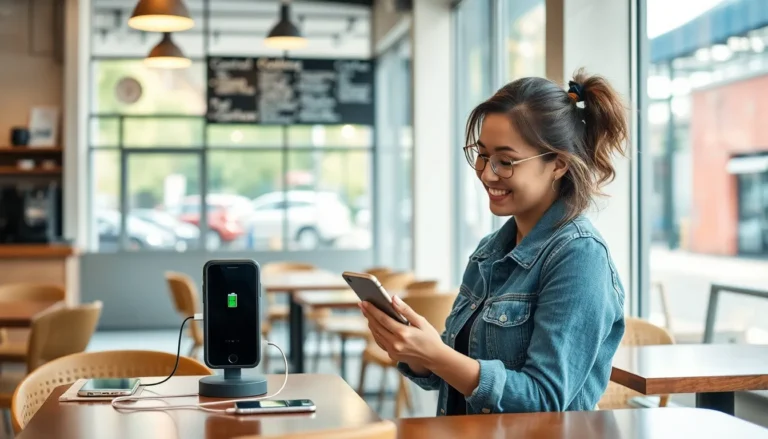Table of Contents
ToggleIn a world where losing your phone feels like losing a limb, mobile tracking apps have become the unsung heroes of modern life. Imagine being able to locate your device faster than you can say “Where’s my phone?” These nifty apps don’t just help you find your lost gadgets; they offer peace of mind in an increasingly chaotic world.
But wait, there’s more! Mobile tracking apps can also keep tabs on loved ones, ensuring they’re safe while giving you a chance to flex your detective skills. With features that range from real-time location tracking to geofencing alerts, these apps are like having a personal assistant who never takes a coffee break. So buckle up as we dive into the world of mobile tracking apps and discover how they can transform your life from frantic searches to effortless tracking.
Overview Of Mobile Tracking Apps
Mobile tracking apps play a significant role in ensuring device security and user safety. These applications offer users a comprehensive approach to tracking and monitoring their devices and loved ones.
Definition And Purpose
Mobile tracking apps are software applications designed to locate, monitor, and manage mobile devices. Their primary purpose involves providing real-time location data to users, enabling them to find lost devices quickly. Many of these apps also incorporate features that allow tracking the whereabouts of family members or friends, promoting safety. With various functionalities like geofencing alerts and emergency notifications, these apps enhance personal security and streamline communication in urgent situations.
Types Of Mobile Tracking Apps
Multiple categories of mobile tracking apps serve different user needs. Device locator apps focus on finding lost or stolen mobile phones, providing accurate GPS coordinates. Parental control apps aim to protect children by monitoring their locations and online activities. Fleet tracking apps cater to businesses, allowing employers to oversee company vehicles and ensure efficient routing. Fitness tracking apps also offer location features, helping users while engaging in outdoor activities. Each type emphasizes specific functionalities while ensuring user safety and device security.
Features Of Mobile Tracking Apps
Mobile tracking apps provide essential features that improve the safety and accessibility of devices. Several key functionalities enhance user experience and security.
Real-Time Location Tracking
Real-time location tracking allows users to see the exact location of a device instantly. This feature enables quick responses in emergencies, ensuring that lost devices are located without delay. Many apps utilize GPS technology to provide accurate position data. Users can share their location with trusted contacts, promoting safety and accountability. Regular updates on location enhance security for both individuals and families.
Geofencing Capabilities
Geofencing capabilities create virtual boundaries around specified areas. Users receive instant notifications if a device enters or exits these areas. This feature is beneficial for monitoring children, providing alerts when they stray beyond safety zones. Businesses can also utilize geofencing for efficient fleet management, receiving alerts when vehicles enter restricted zones. Customizable settings give users control over when and how notifications occur.
Activity Monitoring
Activity monitoring tracks device usage and movements effectively. These apps provide insights into call logs, text messages, and app usage patterns. Parents benefit from monitoring their children’s online activities while ensuring safe usage. Businesses can track employee movements and compliance with company policies, streamlining operations. Users can receive detailed reports, enabling informed decisions based on device interactions.
Benefits Of Using Mobile Tracking Apps
Mobile tracking apps provide numerous advantages, enhancing safety, parental oversight, and business efficiency.
Safety And Security
Safety remains a primary concern for many users. Real-time location tracking ensures that individuals can locate lost devices quickly, which minimizes stress in emergencies. Geofencing features add another layer of protection by alerting users when devices enter or exit predefined areas. Notifications received in these situations promote quick and informed decision-making. Such capabilities are vital for personal security and can significantly reduce risks for individuals.
Parental Control
Parents often rely on mobile tracking apps to maintain their children’s safety. With these apps, monitoring a child’s location becomes straightforward and dependable. Features like activity tracking provide valuable insights into a child’s usage of devices, including call logs and text messages, which can help parents stay informed. Geofencing notifications inform parents when their children enter or leave specific locations, offering peace of mind in daily routines. These functionalities empower parents to safeguard their kids while promoting open communication about device use.
Business Applications
Businesses frequently leverage mobile tracking apps to enhance operational efficiency. Fleet tracking capabilities make it easier to monitor vehicle locations in real time and optimize routes, which leads to cost savings on fuel and better delivery times. Activity monitoring allows managers to track employee productivity, ensuring resources are allocated effectively. In emergencies, rapid communication through tracking apps can facilitate immediate responses to incidents. Overall, these applications support business growth while prioritizing safety and productivity.
Limitations And Concerns
Mobile tracking apps raise several limitations and concerns that users must consider.
Privacy Issues
Privacy poses a significant concern with mobile tracking apps. Unauthorized access can occur if the tracking features fall into the wrong hands. Users must ensure they share tracking permissions only with trusted individuals. Data breaches have been reported, underscoring the need for enhanced security measures. Many users worry about their location data being misused. Regulations like the General Data Protection Regulation (GDPR) may offer some protections, yet not all apps comply with such standards. It’s essential for users to read privacy policies carefully before choosing an app. Transparency regarding data usage promotes informed choices.
Battery Consumption
Battery consumption often represents a drawback for mobile tracking apps. Continuous location tracking utilizes significant power, reducing device battery life. Users may find their devices require frequent charging when using these apps consistently. Background processes drain energy, leading to quicker depletion of battery resources. Some tracking apps provide options to adjust tracking frequency, which helps mitigate this issue. Balancing functionality and battery life becomes crucial for users reliant on real-time tracking. Testing various apps can reveal those that minimize battery impact without sacrificing performance.
Mobile tracking apps have become essential tools for enhancing security and peace of mind in everyday life. Their ability to provide real-time location data and monitor loved ones makes them invaluable for parents and businesses alike. By utilizing features such as geofencing and activity monitoring users can make informed decisions and respond quickly in emergencies.
While the benefits are significant concerns around privacy and battery consumption should not be overlooked. Users must remain vigilant about sharing permissions and understanding the implications of continuous tracking. Ultimately mobile tracking apps offer a practical solution for those seeking to improve safety and streamline communication in an increasingly mobile world.







